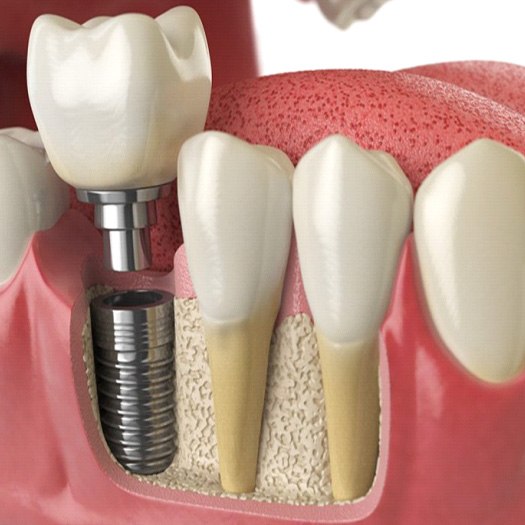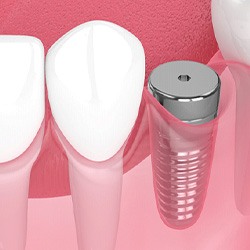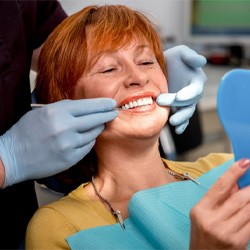Dental Implants – Abingdon, VA
Reclaim Your Modern Smile

Traditionally, when you lost one or more teeth, the dentist would only replace the parts of your teeth that were visible when you smiled. Within the past few decades, dental implants have taken the dental world by storm. Because they replicate a tooth’s root as well as its crown, they end up feeling as natural as they look. Whether you just have a tiny gap in your grin or you need to replace a full row of pearly whites, dental implants are by far the most comprehensive and beneficial way to rebuild your smile after tooth loss. To learn more about dental implants from our Abingdon, VA dentist and how they can help you, contact our dental office today!
Why Choose Amburgey Dental for Dental Implants?
- Dentist with 15 Years of Experience
- Partners with Local Dental Implant Specialists
- Restorations 100% Personalized for Each Patient
What Are Dental Implants?

Dental implants are screw-shaped posts that are often made of titanium (although zirconia implants are becoming increasingly popular). They are surgically inserted into your jawbone to take the place of your teeth’s roots. Once they have been placed, the surrounding jawbone grows around the implants, creating a sturdy base for any number of prosthetic teeth. When placed successfully, dental implants help your new teeth feel and function just like your original ones.
The 4-Step Dental Implant Process

Dental implants offer a variety of unique benefits that you can’t find with other tooth replacement options. This is thanks to the multi-step dental implant process that takes place over a few months. Dental implants must be placed at very precise angles and locations for utmost success. Every patient’s treatment looks a little bit different, but here are four main steps that you can expect.
Initial Dental Implant Consultation

During your consultation, we will go over your oral health and medical history to see if you are a good candidate for dental implant surgery. Some patients end up requiring bone grafting, gum disease treatment, or other preliminary procedures before they are ready to get dental implants. After this, we can move on to plan the rest of your dental implant treatment. During this appointment, we will discuss the timeline of your treatment and the financial aspects so that you know what to expect.
Dental Implant Surgery

The risk of dental implant failure is extremely low, but you never want to take chances when it comes to your smile’s future. That’s why if we decide that you’re a good candidate for dental implants, Dr. Amburgey will refer you to an implant specialist in the Abingdon area who will plan and execute the procedure with incredible precision. This will involve numbing the area, making an incision in the gums, inserting the implant into the jawbone, closing the gums, and placing a protective cap over the post. Then, the healing process commences.
Dental Implant Osseointegration & Abutment Placement

Over the next few months, osseointegration will take place. This is when the implant fuses to the jawbone. Then, another small procedure will take place where the abutments are placed on the posts. This is where your final restoration will be attached. Impressions are taken of your smile so your replacement teeth can be custom-crafted.
Delivery of Dental Implant Restorations

The last step is to return to our dental practice. We will place your custom restoration (which could be a crown, bridge, or denture depending on your needs) and make sure your bite is comfortable. Then, you will be left to enjoy your new and improved smile!
Benefits of Dental Implants

To be honest, dental implants are quite popular now. It’s to the point that dentists place 500,000 of them yearly! You see, implants have a fairly unique placement method. These restorations thus have perks that other kinds – dentures, bridges, etc. – can’t match. If you’d like, Amburgey Dental will happily outline them for you. Simply read on to learn the benefits of dental implants in Abingdon. Otherwise, feel free to call our office for extra details.
Day-to-Day Benefits

Naturally, you’re likely to notice implants’ day-to-day upsides first. The most common of these are:
- Seamless Results – Implants are capped with dental crowns to blend seamlessly with nearby teeth. Their looks are so lifelike that your peers won’t even notice they’re artificial.
- More Confidence – Implants will boost your confidence by restoring your smile. From there, you’ll likely enjoy a calmer mood when seeing your friends and family.
- Easier Eating – By fusing with your jaw, implants restore much of your bite force. This effect means you can eat your favorite tough foods again!
- Low-Effort Care – Unlike dentures or bridges, implants can be cleaned simply. You only need to practice twice-day brushing and once-day flossing. In other words, implants don’t need special creams or solutions.
Health Benefits

Of course, implants don't just have day-to-day perks; they also have health-related ones. Getting the restorations will thus strengthen your body. In particular, implants offer things like:
- Cleaner Mouth – Smile gaps allow harmful bacteria to breed if left unchecked. They’d then (indirectly) cause tooth decay, gum disease, etc. However, implants can fill these spaces and reduce your oral health risks.
- Support for Teeth – When you have gaps in your grin, your remaining teeth will start to tilt and fall out. That said, implants are effective at filling such gaps. So, you could trust them to keep nearby teeth straight and functional.
- Jaw Strength – Unless you act quickly, tooth loss erodes your jawbone. This erosion would then cause a facial collapse. Luckily, dental implants would stimulate your jaw’s bone tissue. This stimulation can then lead to a stronger and fuller jawbone.
- Better Nutrition – Dental implants expand your dietary options since they help you eat food. That means they lead to a boost in your nutritional health.
Long-term Benefits

If you keep them working, implants will offer many long-term benefits. These include the following:
- High Success – When a qualified dentist does it, implant surgery is often quite successful. In fact, the ten-year success rate of dental implants even exceeds 95%!
- Long-Lasting Effects – On average, a dental implant’s lifespan is 15-20 years. Given proper care, it can keep working for roughly 30 years or more. Either result, then, could restore your smile for a lifetime.
- Cost-Effectiveness – In reality, implants are a good long-term investment. They have long lives and thus don’t need many repairs or replacements. To that extent, they’ll let you save money that you’d otherwise spend on a restoration’s follow-up care.
Are Dental Implants Right for You?

To determine whether dental implants are the ideal treatment for you, Dr. Amburgey will first need to closely examine your mouth. Specifically, he’ll have to confirm that there’s enough jawbone density to support the implants and there is no gum disease that could eventually lead to implant failure. From there, we can begin planning your unique treatment. Depending on how many teeth you’ve lost, you may receive a crown, bridge, or denture.

Missing Single Tooth
If you’ve only lost one tooth, a single implant post can be placed where that tooth’s root once was. Once it has fused with the jawbone after a few months, we can restore the implant with a beautiful, lifelike dental crown.

Missing Multiple Teeth
For patients who have lost at least three consecutive teeth, a dental bridge can be supported by implants rather than natural teeth. This option is far more conservative than a traditional bridge, which requires that the structure of adjacent teeth be reduced to make room for the restoration.

Missing All Teeth
Full dentures sit on the gums and rely on suction or messy adhesive to stay in place, but sometimes they slip around anyway. As a sturdier alternative, we can secure a denture onto four to six implants that have been strategically placed throughout the jaw.
Learn More About All-On-4 Dental ImplantsMini Dental Implants

Patients who have been missing teeth for a long time tend to have weakened jawbones that are not strong enough to support traditional implants. The prosthetic roots of mini dental implants are thinner and shorter, allowing them to create a strong foundation for a stable full denture.
Understanding the Cost
of Dental Implants

While dental implants typically have a higher upfront price than bridges or dentures, they’re a better long-term investment. They’re designed to stay in your mouth for a very long time, ideally for the rest of your life. Traditional solutions must be replaced every decade or so, which can rack up an even greater cost over the years than what you initially paid for your implants. It’s also important to keep in mind that the cost of dental implants in Abingdon is different for every patient, as there are a number of variables to consider.
Preliminary Treatments & Dental Implant Surgery

Some patients might not initially be good dental implant candidates. Although there are preliminary procedures you can undergo, like bone grafting to strengthen a jawbone that has been weakened after tooth loss, they will increase your overall cost of treatment.
It’s worth mentioning that for the dental implant surgery, Dr. Amburgey will refer you to an expert implant dentist in Abingdon. This procedure will incur its own cost, which will vary.
The Parts of Your Dental Implant

The number of implant posts you’ll need will certainly influence the cost, but so will other factors. For example, dental implants from various brands or manufacturers might be ideal for different patients. It’s also important to consider the material your implants are made from, as they all come with their own unique price.
Final Dental Implant Restoration

The type of replacement tooth or teeth you’re receiving will also affect the cost. A dental crown that goes over a single implant post, for instance, will cost less than a dental bridge supported by two implants. In the same vein, a full implant denture will have an even higher price tag.
Does My Dental Insurance Cover Dental Implants?

While most dental insurance providers do NOT cover dental implants, there could be exceptions. Many insurance companies offer partial coverage for some portions of the treatment, such as the consultation or your final restoration. Our experienced team members will help you navigate the ins and outs of your plan to ensure you’re maximizing your benefits.
Making Dental Implants Affordable

At Amburgey Dental, we have non-insurance ways of helping patients afford dental implants in Abingdon. One of these is CareCredit. This reliable financing company offers multiple low-interest payment plans to choose from, so there’s sure to be one that can fit within your budget. As an alternative to insurance, our in-house dental membership plan can help you save on most of our services in exchange for a low annual or monthly fee.
Maintaining & Caring for Your Dental Implants

Dental implants have an astonishing success rate of over 95%. However, you can’t expect them to last if you aren’t taking all of the necessary steps to care for them. Here are some health habits for you to implement to keep your newly complete smile healthy for many years to come!
Make Oral Hygiene a Priority

Dental implants cannot develop cavities like your natural teeth because they aren’t made from tooth enamel. However, your surrounding teeth are still at risk, and it is still possible for you to develop gum disease. This can be very harmful and diminish the success of your replacement teeth, so it’s important that you keep up an excellent oral hygiene routine. This includes brushing twice, flossing, and rinsing with mouthwash every single day!
Eat a Healthy Diet

One of the exciting benefits of dental implants is that you don’t need to limit your diet. You are fee to enjoy all the nutritious foods you want without having to worry about you smile. That being said, it’s still a good idea to avoid overindulging in items that are especially sticking or hard. Instead, try to incorporate foods that are high in calcium and vitamin C. These nutrients are needed to keep your jawbone and gums in excellent shape.
Break Bad Habits

Bad habits can cause a variety of problems for teeth and dental implants if you aren’t careful. It is best to refrain from smoking and using other tobacco products. These can slow down healing and make it more challenging for your immune system to fight off infections. You should also avoid using your teeth to open bottles, tear through packaging, bite your nails, and complete other tasks. Instead, find a tool to help you complete your task safely.
Protect Your Dental Implants

Dental implants are incredibly strong, but they aren’t completely indestructible. You should always wear a mouthguard when engaging in contact sports. If you grind your teeth at night, ask your dentist about getting a nightguard to protect your teeth from additional wear and tear as you sleep.
Schedule Regular Dental Checkups

You should continue to see your dentist for regular cleanings and checkups every six months. This way, we can monitor your dental implants, natural teeth, gum tissue, and more. By detecting issues early on, we can address them quickly and might even be able to prevent serious problems from occurring later on.
Dental Implant FAQs

Dental implants in Abingdon are the next best thing to real teeth; however, it’s normal to have some apprehensions about the procedure. We’ll explain every step in your treatment during your initial consultation. In the meantime, here are the answers to frequently asked questions to feel confident about investing in your smile.
How long do dental implants last?
Dental implants are the most reliable method for treating tooth loss. They are proven to last for 30 years or more, which is decades longer than traditional prosthetics. Various factors will influence the lifespan of your new smile, like your health and lifestyle. Your oral hygiene routine is crucial to safeguard your dental implants against failure. Besides brushing and flossing, add an antimicrobial mouthrinse to your daily routine. Although your new teeth will be durable, they aren’t indestructible, so you’ll want to take care to avoid damaging them. Your implant dentist in Abingdon recommends avoiding hard or sticky foods and breaking any bad oral habits, like using your teeth as tools.
Can I take dental implants out?
Your implant posts are surgically placed into your jaw, where your bone will fuse to them through a process called osseointegration. Therefore, you cannot take your dental implants out. Only a trained dental professional can remove them; however, some types of implant dentures are detachable for easy cleaning. Your dental implants will always remain securely in your jawbone.
Are dental implants safe?
Dental implants are safe for most patients who have good oral and general health. Your implant dentist will perform an examination of your mouth and review your medical history to look for any potential concerns, like bone loss. You may need additional procedures to ensure the success of the treatment, like bone grafting or periodontal therapy. If you have certain pre-existing conditions, like cancer or diabetes, you may still be a candidate for the procedure; however, you may have a higher risk of poor healing. Your dentist will recommend specific precautions to lessen the likeliness of post-operative complications.
How can I tell if my dental implant is failing?
Dental implant failure is rare, but it can occur. Common signs of a complication include pain around the implant or inflamed gums. Some patients report their implant feels loose. If you experience any of these symptoms, don’t ignore them. If you wait too long to see a dentist, they may not be able to save your smile. Quick diagnosis and treatment can help prevent dental implant failure.
Am I too old for dental implants?
There isn’t an age requirement or limit for dental implants if you’ve finished growing. You’re never too old to replace your missing teeth; however, seniors often have underlying medical issues that might make surgery or healing riskier. Your dentist will perform a thorough consultation to determine if dental implants are right for you. They’ll create a personalized strategy to ensure your safety and the success of your treatment, no matter your age.
